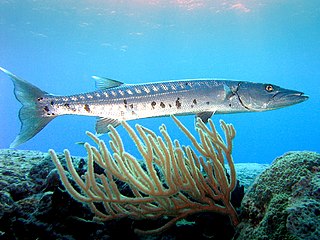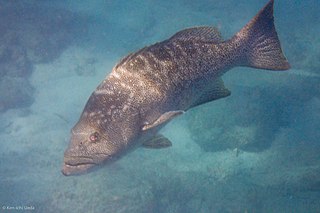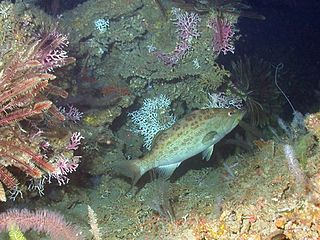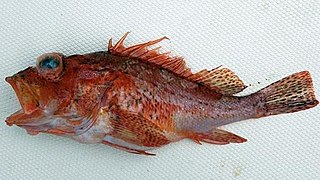
Mycteroperca bonaci, the black grouper, black rockfish or marbled rockfish, is a species of marine ray-finned fish, a grouper from the subfamily Epinephelinae which is part of the family Serranidae, which also includes the anthias and sea basses. Other fish are sometimes called the black grouper including the similar gag grouper, the misty grouper, and the warsaw grouper. This species is found in the western Atlantic Ocean from the northeastern United States to Brazil.

The gag grouper, also known as velvet rockfish, the gag, or charcoal belly, is a species of marine ray-finned fish, a grouper from the subfamily Epinephelinae which is part of the family Serranidae, which also includes the anthias and sea basses. It comes from warmer parts of the West Atlantic, including the Caribbean and Gulf of Mexico. It is a drab, mottled-gray fish lacking the distinguishing features of most other groupers. Its pattern of markings resemble the box-shaped spots of the black grouper. It lacks the streamer-points on the tail fin that scamp and yellowmouth grouper have and lacks yellow coloration around the mouth.

The yellowfin grouper is a species of marine ray-finned fish, a grouper from the subfamily Epinephelinae which is part of the family Serranidae, which also includes the anthias and sea basses. It is found in the warmer waters of the western Atlantic Ocean.

Sphyraena barracuda, commonly known as the great barracuda, is a species of barracuda: large, predatory ray-finned fish found in subtropical oceans around the world.
The Venezuelan grouper is a species of marine ray-finned fish, a grouper from the subfamily Epinephelinae which is part of the family Serranidae, which also includes the anthias and sea basses. It is found in northern South America and the Greater Antilles.

The Gulf grouper is a species of marine ray-finned fish, a grouper from the subfamily Epinephelinae which is part of the family Serranidae, which also includes the anthias and sea basses. It is endemic to Mexico.

The sailfin grouper, also known as the bacalao grouper, colorado grouper or yellow grouper, is a species of marine ray-finned fish, a grouper from the subfamily Epinephelinae which is part of the family Serranidae, which also includes the anthias and sea basses. It is found off islands in the eastern Pacific.

The sawtail grouper is a species of marine ray-finned fish, a grouper from the subfamily Epinephelinae which is part of the family Serranidae, which also includes the anthias and sea basses.. It is endemic to the western coasts of Mexico. The sawtail grouper commonly lives on fields of large boulders with gorgonians and black corals.

The mottled grouper is a species of marine ray-finned fish, a grouper from the subfamily Epinephelinae which is part of the family Serranidae, which also includes the anthias and sea basses. It is found in the eastern Atlantic Ocean and the Mediterranean Sea.

The tiger grouper is a species of marine ray-finned fish, a grouper from the subfamily Epinephelinae which is part of the family Serranidae, which also includes the anthias and sea basses. It is found in the warmer waters of the western Atlantic Ocean.

Mycteroperca rosacea, the leopard grouper or golden grouper, is a species of marine ray-finned fish, a grouper from the subfamily Epinephelinae which is part of the family Serranidae, which also includes the anthias and sea basses. It is found in the Eastern Central Pacific that occasionally makes its way into the aquarium trade.

The longfin crevalle jack is a recently described species of large marine fish classified in the jack family, Carangidae. It inhabits the subtropical waters of the east Atlantic Ocean, ranging along the African coast from Mauritania south at least to Moçamedes in southern Angola, with the species historically present in the Mediterranean Sea. It is an inshore species, known to occasionally penetrate estuaries, possibly to spawn. The species is very similar to the crevalle jack, Caranx hippos, and is separated by its extended dorsal and anal fin lobes as well as more detailed anatomical features including dorsal and anal fin ray counts. The fish is known to reach 127 cm in length and 20.9 kg in weight. The longfin crevalle jack is a predatory fish, taking small fish as its main prey. Due to longstanding confusion between C. fischeri and C. hippos, the importance of each species to African fisheries is poorly understood, with a known combined catch in this region of between 2,233 and 10,054 tonnes per year in 1995–2004. Like its close relatives, the species is considered a powerful gamefish and highly sought after, although their coarse flesh makes for relatively poor quality food.
Climacoporus navalis, the fleet klipfish, is a species of clinid found in subtropical waters of the Atlantic Ocean along the coast of South Africa where it can be found in tide pools. This species can reach a maximum length of 7 centimetres (2.8 in) TL. It is currently the only known member of its genus.

The scamp grouper, also known as scamp, is a species of marine ray-finned fish, a grouper from the subfamily Epinephelinae which is part of the family Serranidae, which also includes the anthias and sea basses. It is found in the western Atlantic Ocean.

Pontinus furcirhinus, one of a number of species known as the "red scorpionfish", is a species of marine ray-finned fish belonging to the family Scorpaenidae, the scorpionfishes. It is found in the eastern Pacific Ocean.
The yellowmouth grouper, also known as the crossband rockfish, grey mannock, hamlet, harlequin rockfish, princess rockfish, rockfish, salmon grouper, salmon rock fish or scamp, is a species of marine ray-finned fish, a grouper from the subfamily Epinephelinae which is part of the family Serranidae, which also includes the anthias and sea basses. It is found in the Caribbean and in the tropical waters of the Atlantic Ocean. It is also found in pockets in Brazil. It is a fairly large fish and it gets its name from the yellow around its mouth.

Mycteroperca acutirostris the comb grouper, western comb grouper or wavy-lined grouper, is a species of grouper from the family Serranidae from the warmer waters of the western Atlantic Ocean.

Epinephelus bruneus, commonly known as the longtooth grouper or the kelp grouper, is a species of marine ray-finned fish, a grouper from the subfamily Epinephelinae which is part of the family Serranidae, which also includes the anthias and sea basses. It is found in northwest Pacific in eastern Asia.

Hyporthodus mystacinus, the misty grouper, black grouper, convict grouper, eightbar grouper or moustache grouper, is a species of marine ray-finned fish, a grouper from the subfamily Epinephelinae which is part of the family Serranidae, which also includes the anthias and sea basses. It is primarily found in the Caribbean and the Gulf of Mexico with populations present around the Galapagos Islands and Central American coastlines.

Lutjanus novemfasciatus, the Pacific dog snapper or Pacific cubera snapper, is a species of marine ray-finned fish, a snapper belonging to the family Lutjanidae. It is native to the eastern Pacific Ocean.



















